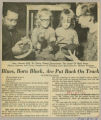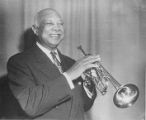Description
Tom Dent interviews Worth Long in Port Gibson, Mississippi. Dent asks about music in Canton and Long discusses a fan harmonica player named Sam Meyers, Lonnie Pitchford, Board Rivers, Clyde Maxwell and Belton Suthermen. Long also mentions a revival recorded by Alan Womack in a Baptist church near Canton. Long explains that a "music town" was defined by its juke joints and access to alcohol. Dry counties could still have access to liquor though bootleggers and paid-off policemen. Juke joints were primarily dance halls, called barrels houses after the barrels of whiskey. They are places for "boogie-woogie" dance blues played on piano. Smaller gatherings may have a single musician on a guitar but the dance halls tended to be larger bands with combinations of piano, vocal, bass, lead, guitar and drum. Long says there is a line drawn in Mississippi between blues and religious music. Long explains that blues is "the devil's music" to religious authorities and that Whites looked down on it. Dent says this is not the case in New Orleans. Long states that Neshoba County was a wet county that brought in a lot of musicians. Fayette and Philadelphia also had popular clubs owned by Charles Evers, Medgar Evers' older brother. Meridian and Jackson also had active night life. Long also mentions that there were several talented and respected female blues musicians including Sister Babe Stovall from near Hazlehurst who played with The Sweethearts of Rhythm. Mississippi John Hurt was also from the area. Dent and Long...
Sound
1991 10 05
Physical rights are retained by the Amistad Research Center. Copyright is retained in accordance with U. S. Copyright Laws.
![Thumbnail for Mississippi - Canton: Worth Long Interviewee [Part 1]](https://d2l9jrtx1kk04i.cloudfront.net/79fc9fa1d754f003cb9bdba55b0f47fa89c62782.png)



















